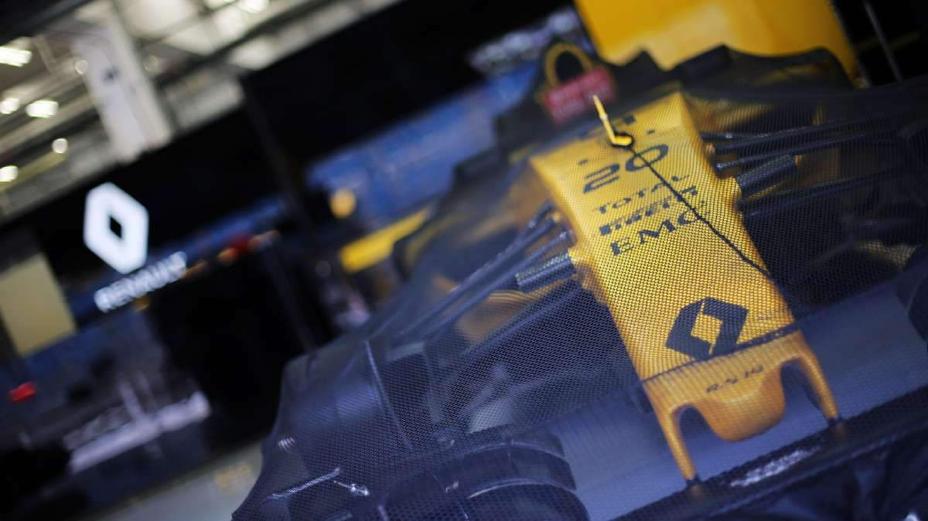BAHRAIN, UAE – Renault Sport Formula One team fought a tough Gulf Air Bahrain Grand Prix with Kevin Magnussen finishing in eleventh place and Jolyon Palmer failing to make the start.
Kevin's race began from the pit lane due to a penalty incurred during practice on Friday but he fought through the field to finish just shy of the points. Jolyon returned to the pits at the end of the formation lap due to suspected hydraulic issue with his car.
- Kevin started the race from the pitlane on new soft compound Pirellis, changing to a set of fresh super soft tires on laps 12, 24 and 38.
- Jolyon started the formation lap in P19 on new super soft tires.
Kevin Magnussen, #20, R.S.16-02: Started from the pit lane (qualified P19), finished: P11
"Starting from the pit lane meant that it was always going to be a strategic race, but I still had some fun fights out on track and we extracted all we had in the car today. We were so close to scoring points; it's frustrating to think what could have been had we not incurred a penalty. In any case, the team did a good job this weekend. We're working very well altogether and the car's performance was encouraging. There are signs of good things to come for the team, including fantastic support from Renault. We have reason to smile. As long as we work really hard now, we will reap the benefits later."
Jolyon Palmer, #30, R.S.16-01: Started P19, finished: DNS
"Having got one Grand Prix under my belt, I was looking forward to racing today so I'm disappointed at not making it past the formation lap. I think we could have had a chance to move up the grid, especially after our strong performance in Melbourne. Everything was okay with the car until the last corner of the lap, but then I had to go straight into the pits. It looks like it was related to hydraulics, and we'll be looking into it with the team to understand what happened. These things can happen in racing, and I certainly want to move to the next race in China as quickly as possible."
Fred Vasseur, Racing Director
"It was a challenging weekend for the team here in Bahrain and we were on the cusp of scoring our first point once more today. Kevin did a very good job to start from the pit lane and get to the checkered flag in eleventh. We were so close to scoring a point and it was teasing us right until the end of the race. On the other hand, it was a real shame for Jolyon; he had to come back to the pits at the end of the formation lap and could not take the start of the race. This was particularly frustrating and we're investigating what went wrong."
A TANGIBLE STEP FORWARD - Q&A with Nick Chester about Bahrain and the upcoming Shanghai Grand Prix
Q1: What's the challenge of the Shanghai International Circuit?
Chester: China is an interesting circuit in terms of layout. The sensitivity is akin to the first two races, in that they're all heavy power tracks so the relationship between drag, aero and power are similar, but they each have unique aspects. The high speed first corner leading into tighter turn two and three is challenging for drivers with a variety of possible driving lines.
Q2: What went wrong for Jolyon in Bahrain?
Chester: It was a hydraulic pump that failed which is an extremely rare occurrence. The pump was just over a tenth of the way through its normal working life; usually if a component fails it's very early in its life or near the end. We're working with our supplier to ascertain the cause and have quarantined the batch of components until we can understand the issue. It was a great shame for Jolyon to have missed the race like that.
Q3: What's the feedback from Kevin's race?
Chester: It was good race from Kevin to finish just shy of the points from a pit-lane start to eleventh. He didn't put a foot wrong and the three-stop strategy worked well. The R.S.16 performed well on the super softs in the race. Were it not for the penalty, Kevin should have started from a reasonable position on the grid and that could well have led to points.
Q4: Where's the performance of the R.S.16 relative to the opposition?
Chester: On race pace there's a very close group in the midfield; we saw this in Australia and we saw this in Bahrain. It means we need to maximize every opportunity we have and every performance increase we can find could mean the difference between finishing just shy of the points or scoring. Our qualifying pace has been behind our race pace in relative terms, so this is an area of focus, but one which goes hand-in-hand with the target of overall performance gains.
Q5: How much has been learned with the new tires and tire rules?
Chester: We're learning the compounds and how best to manage the potential allocations. It's not been a huge surprise that everyone tends to run more on a softer compound than last year. There are different strategies available for those who want to do a stop less and run on a harder compound like we saw in Bahrain. There's some variance but generally teams are dropping down one compound.
Q6: Anything in the treat cupboard for round three?
Chester: We do have some small aero parts to try. However, we will have more further down the line with more aero and engine updates, which should mean a tangible step forward. There's a tight spread of cars ahead of us so we don't need a lot to make a decent improvement.
# # #
























